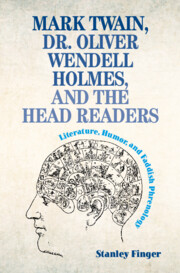 Mark Twain, Dr. Oliver Wendell Holmes, and the Head Readers
Mark Twain, Dr. Oliver Wendell Holmes, and the Head Readers Book contents
- Mark Twain, Dr. Oliver Wendell Holmes, and the Head Readers
- Mark Twain, Dr. Oliver Wendell Holmes, and the Head Readers
- Copyright page
- Epigraph
- Contents
- Tables and Figures
- Preface
- 1 The Birth of a Controversial Doctrine
- 2 Coming to America
- 3 Skeptical in Hannibal
- 4 The River, the West, and Phrenology Abroad
- 5 Mark Twain’s “Small Test”
- 6 Tom, Huck, and the Head Readers
- 7 More Head Readings and a Phrenological Farewell
- 8 Young Holmes and Phrenology in Boston
- 9 An American in Paris
- 10 Quackery and Holmes’s Head Reading
- 11 Holmes’s Professor on “Bumpology”
- 12 Holmes’s “Medicated Novels”
- 13 Mr. Clemens and Dr. Holmes
- 14 Phrenology Assessed
- Epilogue
- References
- Index
6 - Tom, Huck, and the Head Readers
Published online by Cambridge University Press: 17 April 2023
- Mark Twain, Dr. Oliver Wendell Holmes, and the Head Readers
- Mark Twain, Dr. Oliver Wendell Holmes, and the Head Readers
- Copyright page
- Epigraph
- Contents
- Tables and Figures
- Preface
- 1 The Birth of a Controversial Doctrine
- 2 Coming to America
- 3 Skeptical in Hannibal
- 4 The River, the West, and Phrenology Abroad
- 5 Mark Twain’s “Small Test”
- 6 Tom, Huck, and the Head Readers
- 7 More Head Readings and a Phrenological Farewell
- 8 Young Holmes and Phrenology in Boston
- 9 An American in Paris
- 10 Quackery and Holmes’s Head Reading
- 11 Holmes’s Professor on “Bumpology”
- 12 Holmes’s “Medicated Novels”
- 13 Mr. Clemens and Dr. Holmes
- 14 Phrenology Assessed
- Epilogue
- References
- Index
Summary
Mark Twain now began to lampoon the head readers as cheats and frauds. He first did this in The Adventures of Tom Sawyer, which appeared in 1876, and continued to do so in its sequel, Adventures of Huckleberry Finn, which appeared eight years later. He described Tom Sawyer’s Aunt Polly as a believer in “phrenological frauds” and as “an easy victim” in the first of these often-paired novels. More telling, he explained how they operated in Huckleberry Finn, using a phony duke and king bilking unsuspecting victims along the Mississippi River for this purpose. These two characters mention how they rely on gathering advance information for some of their schemes, and they brag about putting on charades. As they saw it, phrenology was an easy-entry business that anyone with a good set of eyes and ears along with some acting skills could exploit. This chapter also presents Twain’s use of phrenology in Life on the Mississippi, a book he completed in 1883 after returning to St. Louis and to relive the river between it and New Orleans.
Keywords
- Type
- Chapter
- Information
- Mark Twain, Dr. Oliver Wendell Holmes, and the Head ReadersLiterature, Humor, and Faddish Phrenology, pp. 127 - 145Publisher: Cambridge University PressPrint publication year: 2023
